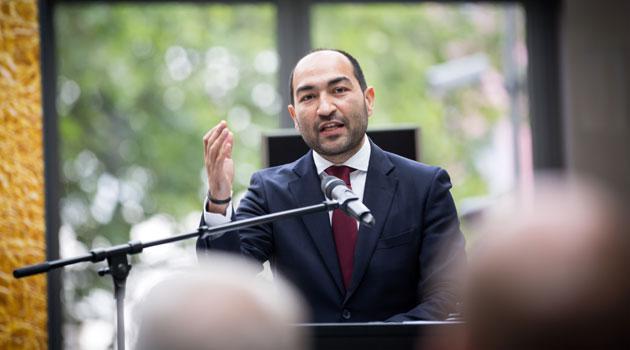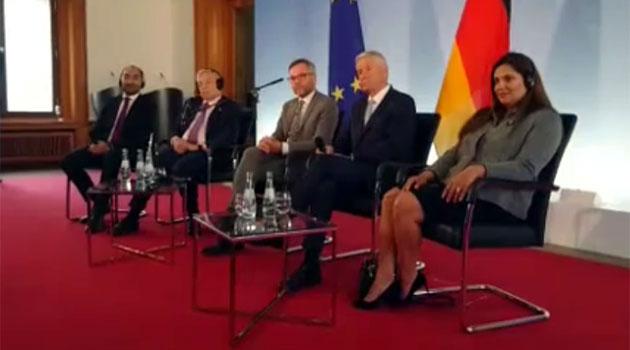In Berlin on 8 June 2017, Zeljko Jovanovic, Chair of the Board of the European Roma Institute for Arts and Culture, welcomed the launch of the European Roma Institute for Arts and Culture (ERIAC). ERIAC is about Roma empowerment, but even more than that, ERIAC has been created to empower the Roma to tell their own history and shape their own futures.
When the organization was being created, its developers encountered fear and doubt from those who dismissed the presence of the Roma culture. On the other hand, they also came across admiration and enthusiasm from those who were curious about the rich history of the Roma.
These views motivated the Romani developers’ strong determination to tell their own stories. In Jovanovic’s words, “what made us carry on was the basic proposition that the story of who we are should be told by us; that the power of defining who we are lies in our own hands.”
ERIAC is about Roma empowerment, but even more than that, ERIAC is made to empower the Roma to tell their own history and shape their own futures. News server
Romea.cz brings you the full speech below:
Launch of the European Roma Institute for Arts and Culture (ERIAC)
Speech by Zeljko Jovanovic, Chair of the Board of the European Roma Institute for Arts and Culture, Berlin, 8 June 2017
I wish you all a very warm welcome on behalf of the Board of ERIAC. For now, the board includes Nicoleta Bitu from the Alliance for ERIAC and Valeriu Nicolae from the Council of Europe.
It has taken us four years to get here. In these four years, I have heard hundreds of people talk about ERIAC. Broadly speaking, I came across two very different views.
One was full of fear, doubt, cynicism. The people with this view claimed that Roma do not need or deserve such an institution. They dismissed the idea that a Roma culture and identity even exist. People with the other view were full of surprise, admiration and enthusiasm. They wondered why such an institution did not exist already and how such a rich Roma culture had survived for so long.
In very different ways, both of these views made our convictions even stronger. Therefore, I am honestly grateful to both of them.
There were times when it was hard; there were times when many of us felt discouraged. But what made us carry on was the basic proposition that the story of who we are should be told by us; that the power of defining who we are lies in our own hands. Today, this proposition becomes the founding principle of ERIAC.
We would not be here today without the Alliance for ERIAC, the Council of Europe, the Open Society Foundations, the German government, and without the many advocates, artists, cultural producers and many friends who supported us.
However, it is important to recognize that this day is part of a cause that is bigger than ourselves. We are building ERIAC today not only with all of you; we are building it on the legacy of the previous generations of Roma intellectuals. Almost 100 years ago, in 1919, the General Union of Roma in Romania was dreaming of a Museum that would preserve and develop our culture. The first Roma World Congress in 1971 set the foundations of our self-definition: That we are Roma and not Gypsies. They and many others built a foundation for ERIAC. I am deeply grateful for their courage and for their ability to persist under much worse conditions than those of today.
ERIAC will belong to the Roma people, to those who need it most: Artists and cultural producers who will challenge not only how prejudice affects non-Roma, but how it affects the way we see ourselves.
We have never had more highly educated Roma, and they present the best hope for the Roma people. But even if many of us are highly educated, the feelings of insecurity and shame in being Roma remain.
In classrooms, books, and the media, we are used to the idea that the majority culture is something to aspire to, that our identity and cultural heritage is a source of shame and not a source of pride. Many of us try to be someone else, try to fit in; we adopt the names of the majority, the religion of the majority, the language of the majority, and forget our own. We tend to say what the majority wants to hear, to show what the majority wants to see—we do everything we can do to be left alone and stay safe. But we are still not safe.
The question is not whether we have solved all the problems: The hard work continues from tomorrow and will last for several generations. The question today is: What is the legacy we can leave for the next generation? What legacy will make all the talent, imagination and experience we have in different parts of Europe come together? Where is the place from which the next generation can tell its own story of the beauty, wisdom and resilience of the Roma in Europe? Today, here in Berlin, we give a simple answer: The legacy that we are leaving for the next generation is the European Roma Institute for Arts and Culture.

